| Day of Wrath | | Director: Carl Theodor Dreyer | | Screenplay: Carl Theodor Dreyer, Poul Knudsen, Mogens Skot-Hansen (based on the novel by Wiers Jenssens) | | Stars: Thirkild Roose (Absalon Pedersson), Lisbeth Movin (Anne Pedersdotter), Sigrid Neiiendam (Meret), Preben Lerdorff-Rye (Martin), Albert Hoeberg (The Bishop), Anna Svierkier (Herlof's Marte) | | MPAA Rating: NR | | Year of Release: 1943 | | Country: Denmark | | | Ordet | | Director: Carl Theodor Dreyer | | Screenplay: Carol Theodor Dreyer (based on the play by Kaj Munk) | | Stars: Henrik Malberg (Morten Borgen), Emil Hass Christensen (Mikkel Borgen), Preben Lerdorff-Rye (Johannes Borgen), Cay Kristiansen (Anders Borgen), Birgitte Federspiel (Inger), Ejner Federspiel (Peter Skraedder), Ove Rud (Pastor), Ann Elisabeth Rud (Maren Borgen), Susanne Rud (Lilleinger Borgen), Gerda Nielsen (Anne Skraedder), Sylvia Eckhausen (Kirstine Skraedder) | | MPAA Rating: NR | | Year of Release: 1955 | | Country: Denmark | | Gertrud | | Director: Carl Theodor Dreyer | | Screenplay: Carol Theodor Dreyer (based on the play by Hjalmar Söderberg) | | Stars: Nina Pens Rode (Gertrud Kanning), Bendt Rothe (Gustav Kanning), Ebbe Rode (Gabriel Lidman), Baard Owe (Erland Jansson), Axel Strøbye (Axel Nygen) | | MPAA Rating: NR | | Year of Release: 1964 | | Country: Denmark | 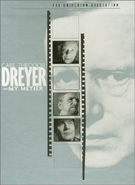 |
| 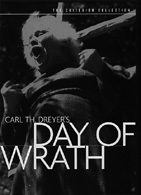 When Day of Wrath (Vredens dag) was released in 1943, its director, Carl Theodor Dreyer, had not produced a feature film in almost 12 years. At the time, Denmark's film industry had been severely weakened by the exodus of many of its best directors due to the occupation by Nazi Germany. Yet, Dreyer returned to his homeland to make his second sound feature, and, as Arthur Knight wrote in his influential cinema history The Liveliest Art, "A kind of spiritual rebirth took place with the release ... of Days of Wrath). When Day of Wrath (Vredens dag) was released in 1943, its director, Carl Theodor Dreyer, had not produced a feature film in almost 12 years. At the time, Denmark's film industry had been severely weakened by the exodus of many of its best directors due to the occupation by Nazi Germany. Yet, Dreyer returned to his homeland to make his second sound feature, and, as Arthur Knight wrote in his influential cinema history The Liveliest Art, "A kind of spiritual rebirth took place with the release ... of Days of Wrath).
Dreyer was already a greatly admired filmmaker, having written and directed several notable films in the silent era, particularly The Passion of Joan of Arc (1928), a film that many still consider to be the pinnacle of silent film art. For his second sound film, Dreyer again reached back into the past, but this time the past of his own country. The story is set in 17th-century Denmark, a time of deep-seated religious superstition in which the trials of accused witches had long since become a standardized fact of life. Day of Wrath is a striking study of religious despotism, psychological repression, and the slow destruction of goodness at the hands of zealots and hypocrites. As it was made during the darkest days of World War II under the scrutinizing gaze of the Nazi occupiers, it is not surprising that Dreyer would chose such severe subject matter (although rumor has it he cast a blond-haired woman in the lead to discourage the Germans from reading the film as a political/national allegory). Part of Dreyer's aesthetic is the slow pace of his films, and many critics at the time complained that Day of Wrath was too plodding for its own good. Bosley Crowther of The New York Times complained that "The tax of [Dreyer's] slow and ponderous tempo upon the average person's time is a rather presumptuous imposition for any motion-picture artist to make." And, during the first viewing, it is hard not to come away with a similar impression, even if you admire Dreyer's painterly visual acumen and the strength of the performances. Yet, a second and third viewing show Dreyer's pacing to be not only appropriate, but deeply effective in suggesting the slow, insidious way in which evil does its work. Dreyer's films have often been described as "spiritual," and part of this comes from his visual skill in evoking the depths of emotional and psychological turmoil. Fascinated by both the intimate details of the human face and the physical placement of his characters within carefully constructed mis en scénè, Dreyer was a master of conveying emotion in a way that can only be called "literary." Day of Wrath tells the story of Anne Pedersdotter (Lisbeth Movin), the young, second wife of a parson, Absalon (Thirkild Roose). Anne ends up falling in love with Absalon's son by a previous marriage, Martin (Preben Lerdorff-Rye), who is much closer to her in age than her aging husband. Anne is a good person, but she is surrounded on all sides by repressive forces, from Absalon's domineering mother, Meret (Sigrid Neiiendam), to the repressed memory that her own mother was denounced as being a witch. Religious persecution lies at the heart of Day of Wrath, yet Dreyer does not see it as a world of black and white, filled with innocent accused and persecuting hypocrites. Absalon is a particularly intriguing character, as he is one of the main authority figures responsible for trying and executing accused witches, yet Dreyer paints him in a sympathetic light as a decent, but flawed man who is simply trying to do what he feels is right. The narrative reaches its climax when Anne is accused of witchcraft for causing Absalon's death when he dies of a heart attack after she admits to him her affair with his son. Dreyer sets up the stakes of accusation in an early subplot that finds an elderly woman named Herlof's Marte (Anna Svierkier) denounced as a witch, brutally tortured into confession, and publicly burned at the stake while children stand by and sing a well-rehearsed song. The threat of denunciation hangs over all that Anne does, and when Dreyer brings the film to its disturbing conclusion in which Anne seems to have been drawn into believing that she is a witch, we see that his largest concern is the way in which a hegemonic regime forces its victims to not only accept their unjust fates, but to believe in it themselves. As the religious elders who benefited so much from the witchcraft hysteria knew, the best victims are the ones who are most willing to believe in their presumed guilt. 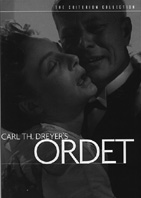 Eleven years later, Dreyer emerged with his third sound film, Ordet, a complex, intriguing multinarrative film that again tackled the issue of religion, but this time in pursuit of the meaning and nature of faith. Ordet (which means "the word") is a rare work about spiritual life and the conflicts of earthly bodies and heavenly desires that doesn't denigrate or simplify religion despite the flawed nature of the characters and of the institution of religion itself. Again, it is a slowly paced, thoughtful film, one that demands multiple viewings and reflection afterward. Eleven years later, Dreyer emerged with his third sound film, Ordet, a complex, intriguing multinarrative film that again tackled the issue of religion, but this time in pursuit of the meaning and nature of faith. Ordet (which means "the word") is a rare work about spiritual life and the conflicts of earthly bodies and heavenly desires that doesn't denigrate or simplify religion despite the flawed nature of the characters and of the institution of religion itself. Again, it is a slowly paced, thoughtful film, one that demands multiple viewings and reflection afterward.
Based on a play by the Danish minister Kaj Munk, who was murdered by the Nazis in 1944, Ordet concerns two Danish families in the mid-1920s. The Borgens, a farm family, is headed by the proud and bull-headed patriarch Morten (Henrik Malberg). He lives with his three sons: the eldest, Mikkel (Emil Hass Christensen), who is married to a decent young woman named Inger (Birgitte Federspiel); the youngest, Anders (Cay Kristiansen); and the middle son, Johnnes (Preben Lerdorff-Rye), who was studying theology but apparently went mad and now believes he is Jesus Christ. The other family, the Skraedders, is headed by a religious-fundamentalist tailor named Peter (Ejner Federspiel). The two families are brought together when Anders and Peter's young daughter, Anne (Gerda Nielsen), fall in love and want to get married. Dreyer gives the sense that Morten and Peter were once friends, but they have since been driven apart by the differing interpretations of what it means to be a Christian. Morten does not take kindly to Peter's rejection of Anders' request for Anne's hand in marriage, which sets off a series of events that put into clear relief the vast gulf between these two men who both profess the same religion, but cannot see eye to eye on what that religion entails. Yet, that is only one thread of Ordet's multilayered narrative. The story takes an abrupt shift when Inger goes into labor and deaths seems imminent, and we realize the entire subplot involving Anders was not the real focus of the film. What makes Ordet so deeply moving is the way in which all the various pieces ultimately fit together and lead smoothly to the stirring climax, which involves a miraculous raising from the dead that might seem hokey in any other movie. The earlier portions of the film established all the characters and their various religious beliefs, but what becomes clear in the end is that none of them really had true faith, from the agnostic Mikkel to the fundamentalist Peter. Thus, Ordet is both a soul-stirring testament to the power of God and the innocence of pure faith, while at the same time it is stunning critique of the pettiness that often accompanies organized religion and the damage that unwavering dogma can have on human lives. 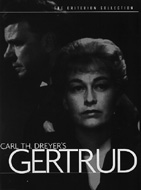 Again, it would be almost a decade before Dreyer would emerge with what would turn out to be his last film, Gertrud, a work that divided audiences and critics right down the middle. Again taking place in the early part of the 20th century, Gertrud does not invoke the spiritual as Dreyer's other films had, but rather concentrates on human passion and the idealistic quest for perfect, soul-fulfilling love from another. It is, in this way, somewhat ironic that Gertrud is such a morose, utterly passionless film—it lacks the seething eroticism that boiled beneath the surface of Day of Wrath or the deep emotional core of Ordet. Gertrud has its defenders now as it did then, but it's hard not to see the film as a step backward rather than forward, in which Dreyer's slow pacing and somber atmosphere finally conspire to work against him. Again, it would be almost a decade before Dreyer would emerge with what would turn out to be his last film, Gertrud, a work that divided audiences and critics right down the middle. Again taking place in the early part of the 20th century, Gertrud does not invoke the spiritual as Dreyer's other films had, but rather concentrates on human passion and the idealistic quest for perfect, soul-fulfilling love from another. It is, in this way, somewhat ironic that Gertrud is such a morose, utterly passionless film—it lacks the seething eroticism that boiled beneath the surface of Day of Wrath or the deep emotional core of Ordet. Gertrud has its defenders now as it did then, but it's hard not to see the film as a step backward rather than forward, in which Dreyer's slow pacing and somber atmosphere finally conspire to work against him.
The titular character, played by Nina Pens Rode, is the unhappy wife of a prominent lawyer, Gustav Kanning (Bendt Rothe). The film signals its primary weakness in the opening scene in which Gertrud professes her unhappiness to Gustav and tells him that she no longer wishes to be his wife. Like all other scenes in the film, it is pure expository dialogue in which characters tell each other everything, yet never look at each other. The lack of eye contact is effective in conveying a world in which comfortably wealthy people have lost the ability to communicate, yet it dominates the film in a way that becomes monotonous. Nobody connects with anybody, which verges on a kind of melodramatic nihilism that denies the audience even the minimal pleasures of an emotional eruption. No, the characters in Gertrud are almost painfully compliant with their lots in life—Gustav eventually emerged for me as the most sympathetic character simply because he is the only one who is allowed an emotional outburst. The film follows Gertrud as she searches for that perfect, satisfying love, something that is ultimately denied her. Her idealism and conviction would have been more engaging if Dreyer hadn't posed them as a form of forced martyrdom. It is plainly obvious that Gertrud will never satisfy her inner longings, especially when she wastes her precious affections on a banal young musician named Erland Jansson (Baard Owe). The cliché of the unsatisfied middle-aged woman throwing herself at the feet of youth is a tired one, and it only serves to lower our impression of Gertrud as an intelligent, independent woman. Gertrud does have its moments, and at times Dreyer's underlying sincerity comes through and we get a sense of what he was trying to accomplish. As one of the most uncompromising directors in the history of cinema, many have read Gertrud as Dreyer's on-screen alter ego, an apt interpretation. Yet, just as Gertrud's uncompromising nature eventually leads her to a solitary life, Dreyer's cinematic convictions ultimately trapped him a corner of uncinematic staginess and heavily-laden symbolism. | Carl Theodor Dreyer Criterion Collection DVD Box Set | | This box set includes four DVDs containing Carl Theodor Dreyer's three feature-length sound films Day of Wrath, Ordet, and Gertrud, as well as a fourth disc with Torben Skjødt Jensen's feature-length 1995 documentary Carl Th. Dreyer—My Métier. | | Widescreen | 1.33:1 (Days of Wrath, Ordet)
1.66:1 (Gertrud) | | Anamorphic | Yes (1.66:1) | | Audio | Dolby Digital 1.0 Monaural | | Languages | Danish | | Subtitles | English | | Supplements | Day of Wrath
Interview excerpts with actors Lisbeth Movin and Preben Lerdorff Rye
Stills gallery
Ordet
Interview excerpt with actress Birgitte Federspiel
Stills gallery Gertrud
Interview excerpts with actors Baard Owe and Axel Strøbye
Archival footage from the time of Gertrud's production
Stills gallery Carl Th. Dreyer—My Métier feature-length 1995 documentary
Interview excerpts with Henning Bendt, Jørgen Roos, and Hélène Falconetti
Biographical essay by Dreyer scholar Edvin Kau
Theatrical trailer | | Distributor | Criterion Collection / Home Vision | | SRP | $79.95 | | | VIDEO | | All three films in this box set look absolutely ravishing, having all been given new digital transfers from 35mm interpositives that were supervised by Henning Bendtsen, the cinematographer who shot Gertrud. While some may find Dreyer's narrative pacing too slow, no one can deny the gorgeous visual nature of these black-and-white films, and Criterion has done an outstanding job of making them look as good as possible. Day of Wrath is presented in its original 1.33:1 aspect ratio, and, as the oldest film in the box, it shows some signs of wear—a few nicks, scratches, and the occasional large blemish—but otherwise it is in wonderful condition. Ordet was also transferred in its original 1.33:1 aspect ratio, and it looks nearly flawless. Gertud, the only widescreen film Dreyer ever made, is presented in an anamorphic transfer in its original 1.66:1 aspect ratio. As with the others, it is beautifully rendered, with bright whites, solid blacks, exquisite detail, and almost no visible grain. | | | AUDIO | | Each film is presented in its original monaural in Dolby Digital 1.0, and they all sound great. The sound design in all these films is fairly sparse, but the soundtrack conveys the hushed tones of the dialogue, the carefully placed ambient sounds, and the minimalist use of music very well with a bare minimum of hiss. | | | SUPPLEMENTS | 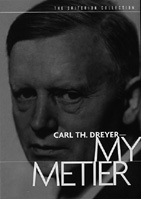 In addition to the three feature films, this excellent box set contains a fourth disc with Carl Th. Dreyer—My Métier, a 95-minute documentary made in 1995 by Danish filmmaker Torben Skjødt Jensen. Unlike many static documentaries, this one is visually fascinating to watch, as Jensen uses beautiful black-and-white photography and an interesting use of camera movements and dissolves to give it an effective fluidity. Jensen documents Dreyer's life from birth to death and explores all his major projects, both realized and unrealized, from his 1919 directorial debut The President (Præsidenten), with its use of extreme close-up that was so rare in the silent era, to his never-fulfilled dream project of making a film about the historical Jesus of Nazareth. Jensen has also managed to gather interviews from almost everyone associated with Dreyer's major works who were still living in 1995, including cinematographers Henning Bendtsen (Ordet, Gertrud) and Jørgen Roos (They Caught the Ferry); actors Birgitte Federspiel (who played Inger in Ordet), Preben Lerdorff Rye (who starred in both Day of Wrath and Ordet), and Lisbeth Movin (who played Anne in Day of Wrath); and Hélène Falconetti (daughter of Renée Jeanne Falconetti, who played the title role so memorably in The Passion of Joan of Arc), among others. The documentary creates a complex portrait of Dreyer, often using his own writings on film as voice-over narration. He ultimately emerges as a great filmmaker who could be both gentle and somewhat cruel, yet will always be remembered for his fierce conviction. On the technical side, the box lists the aspect ratio of the documentary as 1.66:1 (it is nonanamorphic), but the framing seems a little odd so that the aspect ratio is closer to 1.49:1, even though the digital transfer was supervised by Jensen himself. In addition to the three feature films, this excellent box set contains a fourth disc with Carl Th. Dreyer—My Métier, a 95-minute documentary made in 1995 by Danish filmmaker Torben Skjødt Jensen. Unlike many static documentaries, this one is visually fascinating to watch, as Jensen uses beautiful black-and-white photography and an interesting use of camera movements and dissolves to give it an effective fluidity. Jensen documents Dreyer's life from birth to death and explores all his major projects, both realized and unrealized, from his 1919 directorial debut The President (Præsidenten), with its use of extreme close-up that was so rare in the silent era, to his never-fulfilled dream project of making a film about the historical Jesus of Nazareth. Jensen has also managed to gather interviews from almost everyone associated with Dreyer's major works who were still living in 1995, including cinematographers Henning Bendtsen (Ordet, Gertrud) and Jørgen Roos (They Caught the Ferry); actors Birgitte Federspiel (who played Inger in Ordet), Preben Lerdorff Rye (who starred in both Day of Wrath and Ordet), and Lisbeth Movin (who played Anne in Day of Wrath); and Hélène Falconetti (daughter of Renée Jeanne Falconetti, who played the title role so memorably in The Passion of Joan of Arc), among others. The documentary creates a complex portrait of Dreyer, often using his own writings on film as voice-over narration. He ultimately emerges as a great filmmaker who could be both gentle and somewhat cruel, yet will always be remembered for his fierce conviction. On the technical side, the box lists the aspect ratio of the documentary as 1.66:1 (it is nonanamorphic), but the framing seems a little odd so that the aspect ratio is closer to 1.49:1, even though the digital transfer was supervised by Jensen himself.Each of the three discs with the feature films contains additional excerpts from interviews conducted for either Jensen's documentary or a 1966 documentary on Dreyer made by Jørgen Roos. Day of Wrath includes additional interviews with actors Lisbeth Movin and Preben Lerdorff Rye; Ordet has actress Birgitte Federspiel; and Gertrud has actors Baard Owe and Axel Strøbye. The disc with the documentary also has additional interview excerpts with Henning Bendt, Jørgen Roos, and Hélène Falconetti, as well as a theatrical trailer and a detailed biographical essay by Dreyer scholar Edvin Kau. In addition, each disc contains a stills gallery of production photographs and behind-the-scenes shots for each film. The Gertrud disc also contains about eight minutes of silent archival footage (divided into five chapters) shot by Jørgen Roos around the time of that film's production. The box set also contains a nicely designed 22-page booklet that includes photographs and brief biographical descriptions of everyone involved in Jensen's documentary. It is also notable for containing "Thoughts on My Métier," a 1943 essay written by Dreyer, as well as a few brief notes by Jensen on his documentary and a print interview with Jensen conducted by Ulrich Breuning. Copyright © 2001 James Kendrick |
|



 (3.5)
(3.5)

 When Day of Wrath (Vredens dag) was released in 1943, its director, Carl Theodor Dreyer, had not produced a feature film in almost 12 years. At the time, Denmark's film industry had been severely weakened by the exodus of many of its best directors due to the occupation by Nazi Germany. Yet, Dreyer returned to his homeland to make his second sound feature, and, as Arthur Knight wrote in his influential cinema history The Liveliest Art, "A kind of spiritual rebirth took place with the release ... of Days of Wrath).
When Day of Wrath (Vredens dag) was released in 1943, its director, Carl Theodor Dreyer, had not produced a feature film in almost 12 years. At the time, Denmark's film industry had been severely weakened by the exodus of many of its best directors due to the occupation by Nazi Germany. Yet, Dreyer returned to his homeland to make his second sound feature, and, as Arthur Knight wrote in his influential cinema history The Liveliest Art, "A kind of spiritual rebirth took place with the release ... of Days of Wrath). Eleven years later, Dreyer emerged with his third sound film, Ordet, a complex, intriguing multinarrative film that again tackled the issue of religion, but this time in pursuit of the meaning and nature of faith. Ordet (which means "the word") is a rare work about spiritual life and the conflicts of earthly bodies and heavenly desires that doesn't denigrate or simplify religion despite the flawed nature of the characters and of the institution of religion itself. Again, it is a slowly paced, thoughtful film, one that demands multiple viewings and reflection afterward.
Eleven years later, Dreyer emerged with his third sound film, Ordet, a complex, intriguing multinarrative film that again tackled the issue of religion, but this time in pursuit of the meaning and nature of faith. Ordet (which means "the word") is a rare work about spiritual life and the conflicts of earthly bodies and heavenly desires that doesn't denigrate or simplify religion despite the flawed nature of the characters and of the institution of religion itself. Again, it is a slowly paced, thoughtful film, one that demands multiple viewings and reflection afterward. Again, it would be almost a decade before Dreyer would emerge with what would turn out to be his last film, Gertrud, a work that divided audiences and critics right down the middle. Again taking place in the early part of the 20th century, Gertrud does not invoke the spiritual as Dreyer's other films had, but rather concentrates on human passion and the idealistic quest for perfect, soul-fulfilling love from another. It is, in this way, somewhat ironic that Gertrud is such a morose, utterly passionless film—it lacks the seething eroticism that boiled beneath the surface of Day of Wrath or the deep emotional core of Ordet. Gertrud has its defenders now as it did then, but it's hard not to see the film as a step backward rather than forward, in which Dreyer's slow pacing and somber atmosphere finally conspire to work against him.
Again, it would be almost a decade before Dreyer would emerge with what would turn out to be his last film, Gertrud, a work that divided audiences and critics right down the middle. Again taking place in the early part of the 20th century, Gertrud does not invoke the spiritual as Dreyer's other films had, but rather concentrates on human passion and the idealistic quest for perfect, soul-fulfilling love from another. It is, in this way, somewhat ironic that Gertrud is such a morose, utterly passionless film—it lacks the seething eroticism that boiled beneath the surface of Day of Wrath or the deep emotional core of Ordet. Gertrud has its defenders now as it did then, but it's hard not to see the film as a step backward rather than forward, in which Dreyer's slow pacing and somber atmosphere finally conspire to work against him. In addition to the three feature films, this excellent box set contains a fourth disc with Carl Th. Dreyer—My Métier, a 95-minute documentary made in 1995 by Danish filmmaker Torben Skjødt Jensen. Unlike many static documentaries, this one is visually fascinating to watch, as Jensen uses beautiful black-and-white photography and an interesting use of camera movements and dissolves to give it an effective fluidity. Jensen documents Dreyer's life from birth to death and explores all his major projects, both realized and unrealized, from his 1919 directorial debut The President (Præsidenten), with its use of extreme close-up that was so rare in the silent era, to his never-fulfilled dream project of making a film about the historical Jesus of Nazareth. Jensen has also managed to gather interviews from almost everyone associated with Dreyer's major works who were still living in 1995, including cinematographers Henning Bendtsen (Ordet, Gertrud) and Jørgen Roos (They Caught the Ferry); actors Birgitte Federspiel (who played Inger in Ordet), Preben Lerdorff Rye (who starred in both Day of Wrath and Ordet), and Lisbeth Movin (who played Anne in Day of Wrath); and Hélène Falconetti (daughter of Renée Jeanne Falconetti, who played the title role so memorably in The Passion of Joan of Arc), among others. The documentary creates a complex portrait of Dreyer, often using his own writings on film as voice-over narration. He ultimately emerges as a great filmmaker who could be both gentle and somewhat cruel, yet will always be remembered for his fierce conviction. On the technical side, the box lists the aspect ratio of the documentary as 1.66:1 (it is nonanamorphic), but the framing seems a little odd so that the aspect ratio is closer to 1.49:1, even though the digital transfer was supervised by Jensen himself.
In addition to the three feature films, this excellent box set contains a fourth disc with Carl Th. Dreyer—My Métier, a 95-minute documentary made in 1995 by Danish filmmaker Torben Skjødt Jensen. Unlike many static documentaries, this one is visually fascinating to watch, as Jensen uses beautiful black-and-white photography and an interesting use of camera movements and dissolves to give it an effective fluidity. Jensen documents Dreyer's life from birth to death and explores all his major projects, both realized and unrealized, from his 1919 directorial debut The President (Præsidenten), with its use of extreme close-up that was so rare in the silent era, to his never-fulfilled dream project of making a film about the historical Jesus of Nazareth. Jensen has also managed to gather interviews from almost everyone associated with Dreyer's major works who were still living in 1995, including cinematographers Henning Bendtsen (Ordet, Gertrud) and Jørgen Roos (They Caught the Ferry); actors Birgitte Federspiel (who played Inger in Ordet), Preben Lerdorff Rye (who starred in both Day of Wrath and Ordet), and Lisbeth Movin (who played Anne in Day of Wrath); and Hélène Falconetti (daughter of Renée Jeanne Falconetti, who played the title role so memorably in The Passion of Joan of Arc), among others. The documentary creates a complex portrait of Dreyer, often using his own writings on film as voice-over narration. He ultimately emerges as a great filmmaker who could be both gentle and somewhat cruel, yet will always be remembered for his fierce conviction. On the technical side, the box lists the aspect ratio of the documentary as 1.66:1 (it is nonanamorphic), but the framing seems a little odd so that the aspect ratio is closer to 1.49:1, even though the digital transfer was supervised by Jensen himself.